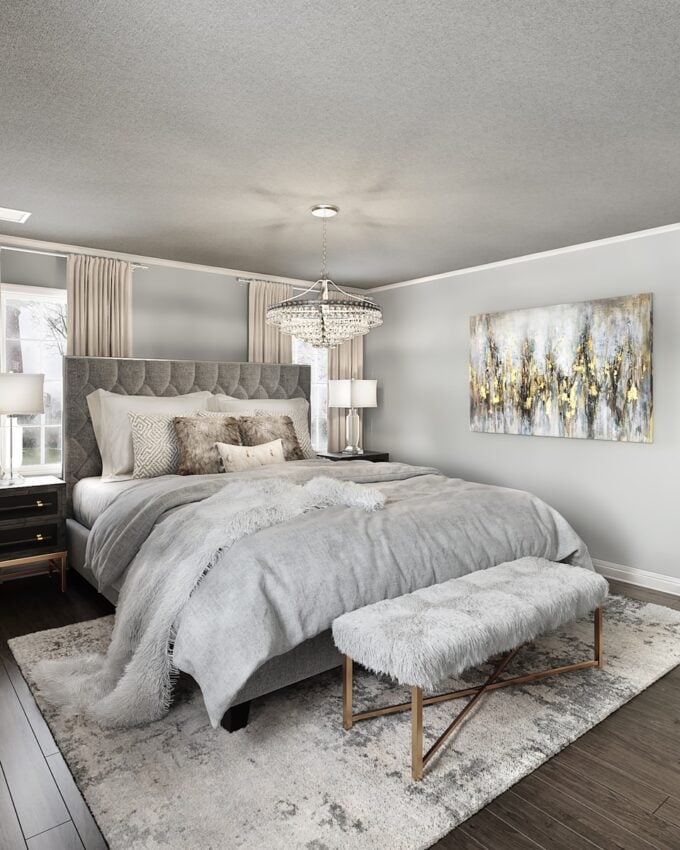The bedroom – a sanctuary for unwinding after a long day, a haven for restorative sleep. Yet, many of us struggle to achieve that deep, restful slumber we crave. While external factors like stress and work schedules can play a role, the environment we create in our bedrooms can significantly impact our sleep quality. By incorporating a few key design elements, you can transform your bedroom into a haven for deep rest, promoting relaxation and setting the stage for a night of rejuvenating sleep.

Tip #1: Invest in Supportive Mattresses and Pillows
The foundation for a good night’s sleep starts with a supportive mattress and pillows. An old, sagging mattress can wreak havoc on your spine, leading to back pain and stiffness that interrupt sleep. Choosing a mattress that provides proper support for your body type is crucial. Similarly, pillows should cradle your head and neck, keeping your spine aligned throughout the night.
Tip #2: The Psychology of Bedroom Colors
The colors we surround ourselves with have a powerful impact on our mood and well-being. When it comes to sleep, color psychology plays a significant role. Opting for calming colors on your bedroom walls can promote relaxation and signal to your body that it’s time to wind down. Soft blues, greens, and lavenders are known for their sleep-inducing properties. These hues create a sense of tranquility and evoke feelings of calmness, mimicking the calming effect of nature.
Tip #3: Arrange Your Lighting
Lighting plays a crucial role in regulating our sleep-wake cycle. Exposure to bright, white light during the day helps keep us alert and energized. However, in the evening, it has the opposite effect, suppressing the production of melatonin, a hormone essential for sleep.
Embrace warm, dim lighting in your bedroom. Table lamps with adjustable brightness allow you to create a relaxing ambiance for winding down before sleep. Consider swapping out harsh overhead lights for softer, diffused lighting options. If external light sources like streetlights disrupt your sleep, blackout curtains or a well-fitting eye mask can be a game-changer.
Tip #4: Designate a Space for Relaxation
Your bedroom shouldn’t just be a place to sleep; it should be a dedicated space for relaxation. Incorporate elements that promote this feeling of tranquility. A comfortable armchair lets you curl up with a good book before bed. Soft throws and plush blankets add a layer of cozy comfort. Consider incorporating calming artwork that evokes feelings of peace and serenity. This could be a nature scene, calming abstract imagery, or even inspirational quotes that promote mindfulness.
Tip #5: Cultivate a Clutter-Free Environment
Clutter can be a major disruption of sleep. A messy, disorganized environment can create mental stress and make it difficult to relax. Dedicate some time each week to decluttering your bedroom. Invest in storage solutions that help keep belongings organized and out of sight. A clutter-free space creates a sense of calm and allows your mind to wind down more easily.
Tip #6: Consider the Power of Scent
Certain scents can have a potent effect on our mood and relaxation levels. Aromatherapy can be a powerful tool for creating a sleep-conducive environment. Lavender is a well-known sleep aid, promotes relaxation and reduces anxiety. Essential oil diffusers or scented candles (always prioritize safety when using candles) can be used to introduce calming scents into your bedroom.
Factors Contributing to Disruptive Sleep
Creating a sleep-friendly environment is important, but it’s only part of the equation. Several health conditions can significantly disrupt sleep quality.
Chronic pain, particularly back pain, can significantly disrupt sleep. If you’re experiencing persistent back pain that disrupts your sleep, consider consulting a spine specialist in your area. In the US, New Jersey is known to have access to top-notch spine surgery centers. Residents near New Jersey like Morristown have access to a network of highly skilled health professionals. This spine surgeon in Morristown can diagnose your condition and propose treatment plans. This might involve pain management strategies or, when necessary, minimally invasive surgical procedures like lumbar laminectomy discectomy or spinal fusion to alleviate back pain.
Conclusion
By incorporating these tips and creating a sleep-friendly haven in your bedroom, you can promote deeper, more restorative sleep. A good night’s sleep makes a world of difference in your physical and mental well-being. So, prioritize your sleep, invest in creating a calming environment, and reap the benefits of a well-rested and rejuvenated you.


